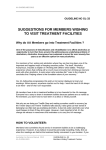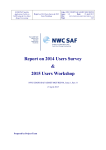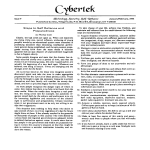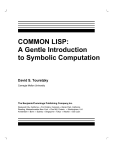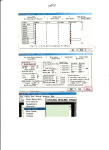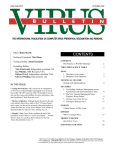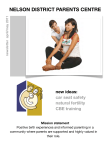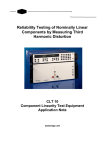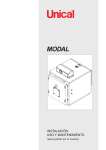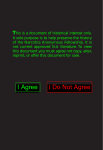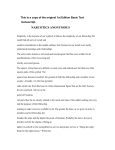Download Mike L.`s BB Study Handout Packet
Transcript
February 24 & 25, 2001 In Allentown Pa. Hosted by the Fogelsville Big Book Study Group Presented by Mike and Kathy L. Of West Orange, N.J. The Set-Aside Prayer * D ear God, please set aside everything I think I know “D [about myself, my disease, the Big Book, the 12 Steps, the Program, the Fellowship, the people in the fellowship, and all spiritual terms, especially you God] so I may have an open mind and a new experience [with all these things]. Please help me see the Truth. Amen.” * “The Set-Aside Prayer” (sometimes referred to as the “Lay-Aside Prayer”), as stated here, is not word-for-word stated in the Big Book; but statements and ideas that have inspired the prayer can be found in the Big Book on the pages given below and are highlighted in bold font. The words used above, excluding those in the brackets, comprise the prayer in its purest form. Feel free to adapt or modify the bracketed words as needed. Our spiritual advisors have found that this prayer seems to have a profound affect when used while taking someone through Steps 1 and 2 out of the Big Book. Page 42, ¶ 2: “But the program of action, though entirely sensible, was pretty drastic. It meant I would have to throw several lifelong conceptions out of the window.” Page 46, ¶ 1: “We found that as soon as we were able to lay aside prejudice and express even a willingness to believe in a Power greater than ourselves, we commenced to get results…” Page 47, ¶ 1: “When, therefore, we speak to you of God, we mean your own conception of God. This applies, too, to other spiritual expressions which you find in this book. Do not let any prejudice you may have against spiritual terms deter you from honestly asking yourself what they mean to you.” Page 47, ¶ 4: “Besides a seeming inability to accept much on faith, we often found ourselves handicapped by obstinacy, sensitiveness, and unreasoning prejudice. Many of us have been so touchy that even casual reference to spiritual things make us bristle with antagonism. This sort of thinking had to be abandoned. Though some of us resisted, we found no great difficulty in casting aside such feelings. Faced with alcoholic destruction, we soon became as open minded on spiritual matters as we had tried to be on other questions. In this respect alcohol was a great persuader. It finally beat us into a state of reasonableness. Sometimes this was a tedious process; we hope no one else will prejudiced for as long as some of us were.” Page 49, ¶ 2: “We, who have traveled this dubious path, beg you to lay aside prejudice, even against organized religion.” 1 Page 58, ¶ 3: “Some of us have tried to hold on to our old ideas and the result was nil until we let go absolutely.” 2 The Circle-and-Triangle The “Circle-and-Triangle” is an ancient spiritual symbol meaning mind, body, and spirit, together as one. Until 1994, this symbol was used on all of AA’s Conference Approved literature. AA World Services no longer uses the symbol on its literature due to “copyright complications”. Second Legacy of Third Legacy of Unity Service Part of our illness it treats is the Part of our illness it treats is the Body Spirit Set of 12 Spiritual Principles is the Set of 12 Spiritual Principles is the 12 Traditions 12 Concepts Explanations of Traditions found in The Concepts are explained in “Twelve & Twelve”, “AA Comes of Age”, “The Language of the Heart”, and various pamphlets “The AA Service Manual combined with Twelve Concepts for World Service” First Legacy of Recovery Part of our illness it treats is the Mind Set of 12 Spiritual Principles is the 12 Steps Through the application of AA’s 36 Spiritual Principles, one can become Whole. Directions for the Steps found in The Big Book Mind, Body, and Spirit, together as One. Our Co-founder, Bill W., said the following about the “Circle-and-Triangle” in 1955 at Alcoholics Anonymous’s 2nd International Convention: “Above us floats a banner on which is inscribed the new symbol for AA, a circle enclosing a triangle. The circle stands for the whole world of AA, and the triangle stands for AA’s Three Legacies of Recovery, Unity, and Service. Within our wonderful new world, we have found freedom from our fatal obsession. That we have chosen this particular symbol is perhaps no accident. The priests and seers of antiquity regarded the circle enclosing the triangle as a means of warding off spirits of evil, and AA’s circle and triangle of Recovery, Unity, and Service has certainly meant all of that to us and much more.” (“AA Comes of Age”, page 139) It was Bill W.’s hope that the Three Legacies, represented by the “Circle-and-Triangle”, would be the means by which God would continue to use the society of Alcoholics Anonymous for so long as it is necessary. 3 The Big Book is a textbook. The directions in a textbook should be followed in order. The recovery portion of the book can be broken down into three parts: What is the problem? What is the solution? What is the program of action? CONTENTS Chapter Page PREFACE FOREWORD TO THE FIRST EDITION FOREWORD TO THE SECOND EDITION FOREWORD TO THE THIRD EDITION xi xiii xv xxii THE PROBLEM 1 2 3 THE DOCTOR'S OPINION BILL'S STORY THERE IS A SOLUTION MORE ABOUT ALCOHOLISM STEP 1 Found in The Doctor’s Opinion, and parts of Chapters 1, 2, and 3 xxiii 1 17 30 THE SOLUTION 4 WE AGNOSTICS STEP 2 44 Found in Chapter 4 (and parts of Chapters 1 & 2) THE PROGRAM OF ACTION STEPS 3 & 4 5 HOW IT WORKS 6 INTO ACTION 7 WORKING WITH OTHERS 8 9 10 11 TO WIVES THE FAMILY AFTERWARD TO EMPLOYERS A VISION FOR YOU Found in Chapter 5 58 STEPS 5, 6, 7, 8, 9, 10, & 11 72 Found in Chapter 6 STEP 12 4 “Carrying this message to alcoholics…” Found in Chapter 7 & “Practicing these principles in all our affairs…” Found in Chapters 8, 9, 10, & 11 89 104 122 136 151 My Name Is Bill W. © Hallmark Hall of Fame April 30, 1989 Starring James Wood as Bill Wilson The scene is a living room. Bill is just down from another drunk and Lois comes home from work and sees him peering out a window. Hanging up her coat, she walks into the room and asks: "Does it have anything to do with me...your drinking?" asks Lois. "No, it's not you. It's me." "Why? Why do you do it to yourself?" she asks. "I've been standing here all afternoon asking myself the same question. I look out the window and I watch all the normal people walking by and it’s funny, I don't think I've ever felt really normal all my life, I mean like other people. I feel different somehow, like I don't really measure up. "Ever since I can remember, I've had this feeling deep down in my gut...scared. I see people laughing, at ease with each other. I'm on the outside looking in, afraid that I won't be accepted. "And then overseas, I found that a drink...a few drinks...makes me feel comfortable, like I always want to feel, gives me courage...to be with people, do things...to dream. "The money, the respect, the success...it was all good for a while, but it never seems enough. I always want doubles of everything to make me alive, worthwhile inside. But then it all began to slip away. I feel cheated, angry, always so full of fear...so I drink...more. And it makes me feel OK for a while. I convince myself that things will turn around tomorrow. Soon that I'll make it all up to you, but it only gets worse. "I...I keep promising you, others, myself..."That's it!" And I think I mean it, but the guilt and the depression...I can't look in the mirror or at you... especially...especially at you. "I've stopped believing in everything, people, God, myself. I know it sounds insane, Lois, but in spite of all this, what I want right now more than anything else...is another drink." © 1989 by Warner Brothers 5 Am I SELFISH? If I am resentful it is because someone did not do what I wanted them to do in the past. They did not do it my way. That is being SELFISH. If I am angry it is because someone is not doing what I want them to do right now. They are not doing it my way. That is being SELFISH. If I am fearful it is because I know someone is not going to do what I want them to do in the future. They are not going to do it my way. That is being SELFISH. If I feel guilty or remorseful it is because I got my own way at your expense. And that is being SELFISH. It seems that page 62 of the Big Book is correct when it says SELFISHNESS is the root of all my trouble. The Echo of Life A man and his son were walking in the forest. Suddenly the boy trips and feeling a sharp pain he screams, "Ahhhh" Surprised, he hears a voice coming from the mountain, "Ahhhh" Filled with curiosity, he screams: "Who are you?" But the only answer he receives is: "Who are you?" This makes him angry, so he screams: "You are a coward!" and the voice answers: "You are a coward!" He looks at his father, asking, "Dad, what is going on?" "Son," the man replies, "pay attention!" Then he screams, "I admire you!" The voice answers "I admire you!" The father shouts, "You are wonderful!" and the voice answers "You are Wonderful!" The boy is surprised, but still can't understand what is going on. Then the father explains, "People call this 'ECHO', but truly it is 'LIFE!' Life always gives you back what you give out! Life is a mirror of your actions. If you want more love, give more love! If you want more kindness, give more kindness,!. If you want understanding and respect, give understanding and respect! If you want people to be patient and respectful to you, give patience and respect!. This rule of nature applies to every aspect of our lives." Life always gives you back what you give out. Your life is not a coincidence, but a mirror of Your own doings. --Arthur Unknown Third Step Parable I'm going to paraphrase a wonderful speaker I heard who told a story about the third step. A drunk is walking (staggering?) along the street and he meets God. "God, I can't do this anymore," he says. "Please, please, will you give me sobriety?" "Sobriety isn't free," says God. "How much money have you got?" Drunk reaches into his pocket. "Fifty bucks." "I'll take it," says God. "You're sober." The man stands up straight, drunk no more. It feels pretty good. Yeah, but... "God?" "Yes?" "I know I gave you my money willingly. But, you see, I need to get gas for my car." "You have a car?" "Well, yes." "You didn't tell me that. I'll take the car." "But..." "I'll take the car. It's part of the price for your sobriety." "But how will I get to work?" "You have a job? I'll take the job, too." "But God, how will I pay my mortgage?" "Mortgage? You have a house? I'll take that too." "But God, my family. How will I take care of them if you have my house and my job." God says to him gently: "In order to keep your sobriety, you must give me these things. But I will let you drive my car as long as you remember it's my car. You can have the job, but remember you're working it for me. It's my house but I will let you live in it. And as for the family, they are my family but I will trust you to take care of them." 6 The Wonderfully Effective Spiritual Structure The “arch through which we passed to freedom”. Step 1: We admitted we were powerless over alcohol— that our lives had become unmanageable. Step 2: Came to believe that a Power greater than our-selves could restore us to sanity. Step 3: Made a decision to turn our will and our lives over to the care of God as we understood Him. "…we decided that hereafter in this drama of life, God was going to be our Director. He is the Principle; we are His agents. He is the Father, and we are His children. Most good ideas are simple, and this concept was the keystone of the new and triumphant arch through which we passed to freedom." (Big Book, page 62, line 27) Step 3 Our DECISION is the KEYSTONE "As soon as a man can say that he does believe, or is willing to believe, we emphatically assure him that he is on his way." (Big Book, page 47, line 16) Step 2 BELIEF is the "It has been repeatedly proven among us that upon this simple cornerstone a wonderfully effective spiritual structure can be built." CORNERSTONE "Upon a foundation of complete willingness I might build what I saw in my friend." (Big Book, page 12, line 22) Step 1 WILLINGNESS is the FOUNDATION 7 Some Variations of “The Third Step Prayer”* * This statement follows the Third Step Prayer on page 63 of the Big Book: “The wording [used for the prayer to affirm our “3rd Step Decision”] was, of course, quite optional so long as we expressed the idea, voicing it without reservation.” Some of our founders and early members of the fellowship used a prayer other than the one on page 63 of the Big Book to take newcomers through their “decision” -- namely because the Big Book wasn’t printed until 1939 and they got our Program from Oxford Group principles. Bill W., Dr. Bob, and Bill D. started making 12 Step calls and taking others through the “steps” in the summer of 1935. Here are a couple examples of “3rd Step Prayers” used by our early members: THIRD STEP PRAYER Used by Clarence Snyder THIRD STEP PRAYER Used by Dr. Bob Dear God, I'm sorry about the mess I've made of my life. I want to turn away from all the wrong things I've ever done and all the wrong things I've ever been. Please forgive me for it all. I know You have the power to change my life and can turn me into a winner. Thank You, God for getting my attention long enough to interest me in trying it Your way. God, please take over the management of my life and everything about me. I am making this conscious decision to turn my will and my life over to Your care and am asking You to please take over all parts of my life. Please, God, move into my heart. However You do it is Your business, but make Yourself real inside me and fill my awful emptiness. Fill me with your love and Holy Spirit and make me know Your will for me. And now, God, help Yourself to me and keep on doing it. I'm not sure I want You to, but do it anyhow. I rejoice that I am now a part of Your people, that my uncertainty is gone forever, and that You now have control of my will and my life. Thank You and praise Your name. Amen. (Both sponsor and protégé on knees…) Sponsor says: God, this is __________, he is coming to You in all humility to ask You to guide and direct him. __________ realizes that his life is messed up and unmanageable. __________ is coming to You Lord in all humility to ask to be one of your children – to work for you, to serve and dedicate his life to you and to turn his will over that he may be an instrument of your love. (Protégé repeats after the sponsor): Lord, I ask that you guide and direct me, and that I have decided to turn my life and will over to you. To serve You and to dedicate my life to You. I thank you Lord, I believe that if I ask this in prayer, I shall receive what I have asked for. Thank you God. Amen. Prayer of Abandonment Father, I abandon myself into Your hands; do with me what you will. Whatever You may do, I thank You; I am ready for all, I accept all. Let only Your will be done in me, and in all Your creatures – I wish no more than this, O Lord. Into your hands I commend my soul; I offer it to You with all the love of my heart, for I love You, Lord, and so need to give myself, to surrender myself into Your hands, without reserve, and without reserve, and with boundless confidence, for You are my Father. --Charles de Foucauld Third Step Prayer “Translated” God, I give myself to you. You use me as you want. Relieve me of my self-will, So I may better do God’s will. Take away my fears, my selfishness, and self-centeredness, So I can be an example of your Power, your Love, and your Way of Life to others. May I do God’s will always. 8 The Third Step Prayer Exercise Here is the Third Step Prayer as stated in the Big Book on page 63: “God, I offer myself to Thee—to build with me and to do with me as Thou wilt. Relieve me of the bondage of self, that I may better do Thy will. Take away my difficulties, that victory over them may bear witness to those I would help of Thy Power, Thy Love, and Thy Way of life. May I do Thy will always!” Try this exercise to be done after you’ve “decided to turn your will and your life over to the care of God as you understood God”. Write your own Third Step Prayer. As the Big Book says on page 63, “The wording was, of course, quite optional so long as we expressed the idea, voicing it without reservation.” (Examples can be found on previous page.) __________________________________________________ __________________________________________________ __________________________________________________ __________________________________________________ __________________________________________________ __________________________________________________ __________________________________________________ __________________________________________________ __________________________________________________ __________________________________________________ __________________________________________________ __________________________________________________ YOUR prayer can be read to your sponsor, spiritual advisor, or a friend (expressing the idea, voicing it without reservation) before we say the Big Book’s Third Step Prayer, together, as a group. - Mile L. 9 RESENTMENT INVENTORY PROMPT SHEET Here is a list of people, institutions and principles that may be helpful in your resentment inventory. Feel free to add to the lists if you need to. PEOPLE Father (Step) Mother (Step) Sisters (Step) Brothers (Step) Grand Father (Step) Grand Mother (Step) Aunts Uncles Cousins Clergy Police Lawyers Judges Doctors Employers Employees Co-Workers In-Laws Husbands Wives Creditors Childhood Friends School Friends Teachers Life Long Friends Best Friends Acquaintances Girl Friends Boy Friends Parole Officers Probation Officers A.A. Friends U.S. Service Friends INSTITUTIONS Marriage Church Religion Races Law Authority Government Education System Hospitals Health Care System Correctional System Mental Health System Welfare Philosophy Nationality Rehabs Mental Institutions 10 PRINCIPLES God Bible Retribution Ten Commandments Jesus Christ Satan Death Life After Death Heaven Hell Sin Adultery Golden Rule Original Sin Seven Deadly Sins Love, Honor, Obey Theory of Reciprocity Twelve Steps Twelve Traditions Twelve Concepts “Do Unto Others…” “Can’t be too thin…” Other Popular Sayings FEAR INVENTORY PROMPT SHEET Here is a list of fears that may be helpful in your fear inventory. Feel free to add to the lists if you need to. Fear Of God Fear there is no God Fear Of Dying Fear Of Living Fear Of Insanity Fear Of the Truth Fear Of Lies Fear Of Insecurity Fear Of Rejection Fear Of Acceptance Fear Of Loneliness Fear Of Disease's Fear Of Drinking Fear Of Relapse Fear Of Sex Fear Of no Sex Fear Of Sin Fear Of Authority Fear Of Not Being in Control Fear Of Heights Fear Of Working Fear Of Not Working Fear Of Parents Fear Of Losing A Wife Fear Of Losing A Husband Fear Of Losing A Child Fear Of Not Having a Relationship Fear Of Being in a Relationship Fear Of Animals Fear Of Insects Fear Of Police Fear Of Jail Fear Of Doctors Fear Of Stealing Fear Of Creditors Fear Of Being Found Out Fear Of Failure Fear Of Homosexuals & Lesbians Fear Of Failure Fear Of Success Fear Of Responsibility Fear Of Physical Pain Fear Of Drowning Fear Of Men Fear Of Women Fear Of Being Alone Fear Of People Fear Of Crying Fear Of Poverty Fear Of Races Fear Of The Unknown Fear Of Abandonment Fear Of Intimacy Fear Of Disapproval Fear Of Confrontation Fear Of Sobriety Fear Of Hospitals Fear Of Feelings Fear Of Getting Old Fear Of Hurting Others Fear Of Making Amends Fear Of Writing Inventory Fear Of Violence Fear Of Being Alive Fear Of Government Fear Of Gangs Fear Of Gossip Fear Of Wealth Fear Of Guns Fear Of Change Fear Of Anger Fear Of Love Fear Of Fear 11 RESENTMENT INVENTORY I listed people, institutions and principles with whom I am angry. I am resentful at: In most cases it was found that the following was hurt, threatened or interfered with. I asked myself why I am angry? The cause: Putting out of my mind the wrongs others had done, I resolutely looked for my own mistakes. Affects my: S E L F E S T E E M P O C K E T B O O K A M B I T I O N S S E C U R I T Y P R I D E P E R S O N A L R S R E E E L X L A A T T I I O O N N S S Where had I been selfish, dishonest, self-seeking and frightened? Though a situation had not been entirely my fault, I try to disregard the other person involved entirely. Where was I to blame? (What did I do?) Use this sheet to get started… Keep the next page blank to make copies… 12 RESENTMENT INVENTORY I listed people, institutions and principles with whom I am angry. I am resentful at: In most cases it was found that the following was hurt, threatened or interfered with. I asked myself why I am angry? The cause: Putting out of my mind the wrongs others had done, I resolutely looked for my own mistakes. Affects my: S E L F E S T E E M P O C K E T B O O K A M B I T I O N S S E C U R I T Y P R I D E P E R S O N A L R S R E E E L X L A A T T I I O O N N S S Where had I been selfish, dishonest, self-seeking and frightened? Though a situation had not been entirely my fault, I try to disregard the other person involved entirely. Where was I to blame? (What did I do?) 13 FEAR INVENTORY I am fearful of: Why do I have this fear: “God, please remove my fear of How did self-reliance fail me? ____________ and direct my What did I do (or not do) to set the ball attention to what You would have rolling with this fear? me be.” Use this sheet to get started… Keep the next page blank to make copies… 14 FEAR INVENTORY I am fearful of: Why do I have this fear: “God, please remove my fear of How did self-reliance fail me? ____________ and direct my What did I do (or not do) to set the ball attention to what You would have rolling with this fear? me be.” 15 SEX & HARMS INVENTORY Did I unjustifiably arouse: Whom did I hurt? J E A L O U S Y S U S P I C I O N B I T T E R N E S S Where was I at fault? Where had I been selfish, dishonest or inconsiderate? What should I have done instead? Use this sheet to get started… Keep next page blank for copies… 16 SEX & HARMS INVENTORY Did I unjustifiably arouse: Whom did I hurt? J E A L O U S Y S U S P I C I O N B I T T E R N E S S Where was I at fault? Where had I been selfish, dishonest or inconsiderate? What should I have done instead? 17 Chosen Sex Ideal “In this way we tried to shape a sane and sound ideal for our future sex life.” (page 69, ¶2) SANE - Mentally healthy, showing sound judgement; reasonable. SOUND - Free from defect, decay or damage; in good condition. IDEAL - A conception of something in its perfection; an ultimate endeavor; a goal. “We subjected each relation to this test - was it selfish or not? We asked God to mold our ideals and help us to live up to them. We remembered always that our sex powers were God-given and therefore good, neither to be used lightly or selfishly nor to be despised and loathed.” (page 69, ¶2) Use the 4th column of Sex & Harms Inventory (What should I have done instead?) to write your chosen SEX IDEAL: ___________________________________________________________________________ ___________________________________________________________________________ ___________________________________________________________________________ ___________________________________________________________________________ ___________________________________________________________________________ ___________________________________________________________________________ ___________________________________________________________________________ ___________________________________________________________________________ ___________________________________________________________________________ ___________________________________________________________________________ “Whatever our ideal turns out to be, we must be willing to grow toward it. We must be willing to make amends where we have done harm, provided that we do not bring about still more harm in so doing. In other words, we treat sex as we would any other problem. In meditation, we ask God what we should do about each specific matter. The right answer will come, if we want it.” (page 69, ¶3) “Suppose we fall short of the chosen ideal and stumble? Does this mean we are going to get drunk? Some people tell us so. But this is only a half-truth. It depends on us and on our motives. If we are sorry for what we have done, and have the honest desire to let God take us to better things, we believe we will be forgiven and will have learned our lesson. If we are not sorry, and our conduct continues to harm others, we are quite sure to drink. We are not theorizing. These are facts out of our experience.” (page 70, ¶1) “To sum up about sex: We earnestly pray for the right ideal, for guidance in each questionable situation, for sanity, and for the strength to do the right thing. If sex is very troublesome, we throw ourselves the harder into helping others. We think of their needs and work for them. This takes us out of ourselves. It quiets the imperious urge*, when to yield would mean heartache.” (page 70, ¶2) * Imperious - Domineering; Overbearing. Urgent; Pressing. Dictatorial. “Imperious urge” - also known as “horniness”. 18 Were entirely ready to have God remove all these defects of character… Check off the defects that you found when you took Steps 4 & 5: Abusing others Anger (7) Arguing Arrogance Boasting Cheating Closed-mindedness Cold-heartedness Complaining Controlling others Corrupt companions Cowardice Criticizing * Dependency Destructiveness Deviousness Dishonesty * Enviousness * (7) Exaggeration Excess Fanaticism Favoritism Fear * Filthy-mindedness Gluttony (7) Gossiping * Greed (7) Hate * Hopelessness Immodesty Impatience * Injustice Insincerity * Insulting Intolerance Irresponsibility Jealousy * Laziness * Lewdness Lust (7) Lying * Meddling Miserliness Negative thinking * Pessimism Prejudice Pride (7) Procrastination * Recklessness Resentment * Revenge Sarcasm Secretiveness Self condemnation * Self-indulgence Self-justification * Self-pity * Selfishness * Sloth (7) Theft Thrill-seeking Thoughtlessness Uncleanness Vulgarity * Waste * = One of 20 character defects identified by Clarence Snyder, who was about the fortieth man sponsored by Dr. Bob. (7) = One of the "Seven Deadly Sins" mentioned in the “Twelve & Twelve” 19 Humbly asked Him to remove our shortcomings… “Nature abhors a vacuum…” Wrongs / Defects / Shortcomings Resentment, Anger Fear, Cowardice Self-Pity Ask God to Replace them with Assets / Positive Traits Forgiveness Courage Self-Forgetfulness Self-Justification Humility Self-Importance, Egotism Modesty Self-Condemnation, Guilt Self-Valuation Lying, Evasiveness, Dishonesty Honesty Impatience Patience Hate False Pride, Phoniness, Denial Jealousy Envy Laziness Procrastination Insincerity Love Unpretentiousness Trust Satisfaction Activity, Industriousness Promptness Straightforwardness Negative Thinking Positive Thinking Immoral Thinking Spiritual, Clean Thinking Perfectionism, Intolerance Criticizing, Loose Talk, Gossip Greed Tolerance Praise for Others Generosity 20 SEVENTH STEP PRAYER Page 76, Big Book, Alcoholics Anonymous “My Creator, I am now willing that you should have all of me, good and bad. I pray that you now remove from me every single defect of character which stands in the way of my usefulness to you and my fellows. Grant me strength, as I go out from here, to do your bidding. Amen.” ORIGINAL SEVENTH STEP PRAYER Used by Dr. Bob Dear God, I am coming to You on my knees in all humility to humbly ask You to forgive all my past wrongs and to remove all my defects of character. I want to start a new life today, and I ask You to help me do so and to keep helping if I keep asking. In Step Three, I turned my will and my life over to Your care. Thank You for taking complete control of my life, and thank You for this opportunity to wipe my slate clean and start my life anew. In Steps Four, Five and Six I have completed my moral inventory and admitted to myself and another person the exact nature of my wrongs. I now admit these wrongs to You, God. I am entirely ready to ask and pray now that You please remove from me every single defect of character. Specifically, I ask You to remove the following shortcomings listed in my Fourth Step moral inventory: (Read aloud here those defects from your list.) Thank You, God, for this opportunity for a new beginning in my life and a chance to be a part of the solutions in life instead of the problems. Please grant me wisdom, knowledge and strength as I go out from here to do Your work and live the Victorious Life You designed for me. Thank You, God, for the steps which will make Your plan for my life clear to me. Thank You and praise Your name. Amen. SEVENTH STEP PRAYER Used by Clarence Snyder (Both sponsor and protégé on knees…) Lord, here is your child, __________… He is coming to you in all humility to humbly ask your forgiveness, believing that anything he asks in prayer, he humbly shall receive. (Protégé repeats after sponsor…) I, __________, humbly ask you oh Lord, to remove my shortcomings and forgive me, my sins and trespasses, and ask in all humility that you will remove my defects and shortcomings because I am one of your children and I truly believe. Thank you, God. Amen. (Sponsor says…) Your sins are removed… if you truly believe. Thank you, Lord. Amen. 21 22 Amends & Restitution List Step 8 says, “Made a list of all persons we had harmed, and became willing to make amends to them all.” Step 9 says, “Made direct amends to such people wherever possible, except when to do so would injure them or others.” * “+” (plus sign) = Willing to make the amend “-“ (minus sign) = Not willing (If you have any minuses, pray for the willingness.) ** There may be additional harms you’ve caused this person. Ask them, “Is there any other way I’ve harmed you that I’m not aware of?” *** Fill this space in after you’ve made your initial approach to the person and you’ve asked them “What can I do to right this wrong?” * +/- • • • • • • Whom did I harm **The harm I caused ***To make the amend I will… 9th Step Prayers from the Big Book “Reminding ourselves that we have decided to go to any lengths to find a spiritual experience, we ask [God] that we be given strength and direction to do the right thing, no matter what the personal consequences may be.” (pg. 79, ¶ 1) “If we have obtained permission [from other people who might be affected by us making this amend], have consulted with others, asked God to help and the drastic step is indicated we must not shrink.” (pg. 80, ¶ 1) “Each might pray about it [in domestic problems], having the other one's happiness uppermost in mind.” (pg. 82, ¶ 1) “So we clean house with the family, asking each morning in meditation that our Creator show us the way of patience, tolerance, kindliness and love.” (pg. 83, ¶ 1) Examples of 9th Step Prayers Asked before we attempt every amend: "God, with regard to this amend, please remove my fear and give me strength, courage and direction to do the right thing, no matter what the personal consequences may be. Amen" (from the thoughts on pg. 79, ¶ 1) Cleaning house with our family, we pray each morning: "God, please show me how to find patience, tolerance, kindness and love in my heart, my mind and my soul. Please help me show these attributes to my family and also, to those around me. Amen" (from the thoughts on pg. 83, ¶ 1) 23 Important Points Regarding Amends & Restitution Excerpted from the Big Book’s explanation of Step 9, pages 76 - 83 Amend type (a) – The people we hate / resent: It may be some have done us more harm than we have done them. Most alcoholics owe money. Let them know you're sorry. Drinking made us slow to pay. Some of us padded expense accounts, fell behind on child support, wrote bad checks, and committed other offenses of the law. We remind ourselves that we must be willing to go to any lengths to correct these mistakes if we are to stay sober. With a person we dislike, we take the bit in our teeth. It is harder to go to an enemy than a friend, but the benefit is greater. Go in a helpful, forgiving spirit. Do not criticize or argue. We are there to sweep off OUR side of the street. Nothing can be accomplished until we do so. Discuss your faults, not his or hers. Be calm, frank, open. It doesn't matter if they accept the apology or throw us out of the office. We've done our part. Amend type (b) – The people / institutions owed money: We don't dodge anyone. In some cases, some of us had to disclose our alcoholism by way of explaining what drove us and what we are now trying to do. We do not try to beat anyone out of anything, but we arrange a deal that we can live up to. Arranging time payments has worked for many of us. If we fear facing our creditors, we often drink. Amend type (c) – Incidents of criminal offense: We don't have the power to do this. We ask God for strength and direction. We don't worry about the consequences. We know God will protect us if we try to do the right thing. We may lose position or reputation. We are willing anyway. We must not shrink at anything. Amend type (d) - Incidents of domestic trouble: We may have committed adultery. After years with a drunk, spouses get worn out, resentful, and uncommunicative. If the spouse does not know, we do not always say it is best to tell. If she knows something, we admit our fault. Some think just being sober in the home now is enough. It isn't. Just saying we are sorry will not do. We sit with the family and analyze the past, not criticizing any of them. We begin to feel self-pity (sorry for ourselves). So we look around for another, feeling justified, when WE were really the source of the problem in the first place. Sometimes that leads to guilt feelings. We have to do something about this. We have no right to name the names of others involved. Keep in mind we are dealing with the most horrible human emotion: jealousy. Don't risk more combat over this. We have treated spouses and family in a shocking way. We have been like a tornado. We broke hearts and uprooted affection, and our selfishness kept the home in turmoil. Yes, they may have defects, but many of them were inspired by our behaviors. We pray each morning for God to show us the way of patience, tolerance, kindliness, and love. Amend type (e) – Wrongs we can never fully right: Be very careful about listing anyone or anything here. We only list someone here if we can HONESTLY say that the wrong cannot be righted, usually when to do so would further injure them or another person. We are willing (or pray for the willingness to become willing) to make the amend if we could. This should also be discussed with others practicing this way of life because we are very good at justifying just about anything. If the case is that they cannot be seen, we write them an honest letter. We don't delay if it can be avoided. We do not have to be scrapping, but we do have to be sensible, tactful, considerate and humble. 24 Directions for Steps 10 & 11* From pages 84 – 88 of the Big Book, Alcoholics Anonymous Step Ten suggests we continue to take personal inventory and continue to set right any new mistakes as we go along. • Continue to watch for selfishness, dishonesty, resentment, and fear. [Step 4] • When these crop up, we ask God at once to remove them. [Steps 6 & 7] • We discuss them with someone immediately [Step 5] • and make amends quickly if we have harmed anyone. [Steps 8 & 9] • Then we resolutely turn our thoughts to someone we can help. • Love and tolerance of others is our code. Step Eleven suggests prayer and meditation. We shouldn’t be shy on this matter of prayer. We believe we can make some definite and valuable suggestions. When we retire at night, we constructively review our day. • Were we resentful, selfish, dishonest or afraid? • Do we owe an apology? • Have we kept something to ourselves which should be discussed with another person at once? • Were we kind and loving toward all? • What could we have done better? • Were we thinking of ourselves most of the time? • Or were we thinking of what we could do for others, of what we could pack into the stream of life? • But we must be careful not to drift into worry, remorse or morbid reflection, for that would diminish our usefulness to others. • After making our review we ask God’s forgiveness and inquire what corrective measures should be taken. On awakening let us think about the twenty-four hours ahead. We consider our plans for the day. • Before we begin, we ask God to direct our thinking, especially asking that it be divorced from self-pity, dishonest or self-seeking motives. • In thinking about our day, if faced with indecision, we ask God for inspiration, an intuitive thought or a decision. We relax and take it easy. We don’t struggle. • We usually conclude the period of meditation with a prayer that we be shown all through the day what our next step is to be, that we be given whatever we need to take care of such problems. • We ask especially for freedom from self-will, and are careful to make no request for ourselves only. We may ask for ourselves, however, if others will be helped. We are careful never to pray for our own selfish ends. • If circumstances warrant, we ask our wives or friends to join us in morning meditation. If we belong to a religious denomination which requires a definite morning devotion, we attend to that also. If not members of religious bodies, we sometimes select and memorize a few set prayers which emphasize the principles we have been discussing. There are many helpful books also. As we go through the day… • …we pause, when agitated or doubtful, and ask for the right thought or action. • We constantly remind ourselves we are no longer running the show, humbly saying to ourselves many times each day “Thy will be done.” We are then in much less danger of excitement, fear, anger, worry, self-pity, or foolish decisions. It works—it really does. * Note: These are only the directions for Steps 10 & 11 as described in The Big Book on pages 84 - 88. The many promises given in these two steps are not listed on this sheet. Please be sure to review the 10th & 11th Step promises. 25 Prayers in the Big Book Page ¶ 63 2 67 1 68 3 “God, I offer myself to Thee—to build with me and to do with me as Thou wilt. Relieve me of the bondage of self, that I may better do Thy will. Take away my difficulties, that victory over them may bear witness to those I would help of Thy Power, Thy Love, and Thy Way of life. May I do Thy will always!” We asked God to help us show them the same tolerance, pity, and patience that we would cheerfully grant a sick friend. When a person offended we said to ourselves, “This is a sick man. How can I be helpful to him? God save me from being angry. Thy will be done.” We ask Him to remove our fear and direct our attention to what He would have us be. “Fourth-Step fear prayer” 69 3 We asked God to mold our [sex] ideals and help us to live up to them. “Fourth-Step ideals prayer” 69 4 In meditation, we ask God what we should do about each specific matter [regarding sex harms]. 70 2 To sum up about sex: We earnestly pray for the right ideal, for guidance in each questionable situation, for sanity, and for the strength to do the right thing. 75 3 We thank God from the bottom of our heart that we know Him better. 76 1 If we still cling to something we will not let go, we ask God to help us be willing. 76 2 76 3 “My Creator, I am now willing that you should have all of me, good and bad. I pray that you now remove from me every single defect of character which stands in the way of my usefulness to you and my fellows. Grant me strength, as I go out from here, to do your bidding. Amen.” We have then completed Step Seven. If we haven’t the will to do this, we ask until it comes. 79 2 Reminding ourselves that we have decided to go to any lengths to find a spiritual experience, we ask that we be given strength and direction to do the right thing, no matter what the personal consequences may be. 82 1 Each might pray about it, having the other one’s happiness uppermost in mind. 83 1 So we clean house with the family, asking each morning in meditation that our Creator show us the way of patience, tolerance, kindliness and love. “Ninth-Step patience, tolerance, kindliness and love prayer” 84 2 When these [selfishness, dishonesty, resentment, and fear] crop up, we ask God at once to remove them. “Tenth-Step prayer” 86 1 After making our review we ask God’s forgiveness and inquire what corrective measures should be taken. “Eleventh-Step nightly review prayer” 86 2 Before we begin [our morning meditation], we ask God to direct our thinking, especially asking that it be divorced from self-pity, dishonest or self-seeking motives. “Eleventh-Step on awakening / direct our thinking prayer” 86 3 87 2 87 4 Here [if faced with indecision while thinking about the day] we ask God for inspiration, an intuitive thought or a decision. We usually conclude the period of meditation with a prayer that we be shown all through the day what our next step is to be, that we be given whatever we need to take care of such problems. We ask especially for freedom from self-will, and are careful to make no request for ourselves only. We may ask for ourselves, however, if others will be helped. As we go through the day we pause, when agitated or doubtful, and ask for the right thought or action. We constantly remind ourselves we are no longer running the show, humbly saying to ourselves many times each day “Thy will be done.” 164 2 Ask Him in your morning meditation what you can do each day for the man who is still sick. “Third-Step Prayer” “Fourth-Step resentment prayer” “Fourth-Step sex-relations-amends prayer” “Fourth-Step prayer for ideals, guidance, sanity and strength” “Returning home… after Fifth-Step prayer” “Sixth-Step willingness prayer” “Seventh-Step Prayer” “Eighth-Step willingness prayer” “Ninth-Step strength and direction to do the right thing prayer” “Ninth-Step let by-gones be by-gones prayer” “Eleventh-Step indecision prayer” “Eleventh-Step end-ofmeditation prayer” “Eleventh-Step when agitated or doubtful prayer” “Twelfth-Step Call prayer” 26 The Circle & Triangle "When the spiritual malady is overcome, we straighten out mentally and physically." - Big Book page 64 (When it says "physically", please keep in mind that this includes the physical world around us.) For me, the circle & triangle represents the Alcoholics Anonymous solution to alcoholism. It is a perfect overview of our three-part answer (unity, recovery, & service) to our three-part disease (physical, mental & spiritual). The foundation of this triangle (which the rest of the solution is built upon) is recovery. The set of 12 spiritual principles associated with recovery are contained in the 12 Steps (which are located in the Big Book, pages i - 164; and then talked about in the 12 & 12, pages 15 - 125). The part of the disease that it treats is the mental. The left side of this triangle is unity, which can be found in fellowship with other AA's. The set of 12 spiritual principles associated with unity are contained in the 12 Traditions (which are located in the 12 & 12, pages 129 192). The part of the disease that it treats is the physical. And the right side of this triangle is service, which can be found in carrying the message and, with unselfishness & love, contributing inside and outside of AA. The set of 12 spiritual principles associated with service are contained in the 12 Concepts (which are located in the booklet "Twelve Concepts for World Service"). The part of the disease that it treats is the spiritual (remember that the Big Book says on pages 14 - 15 that "we perfect and enlarge our spiritual life through work and self-sacrifice for others", and on pages 14, 76, 88 & 93 it says, "Faith without works is dead"). Also, notice that the sides of the triangle are all equal in size, which means that not only do I need to be living in all three areas but that I need to incorporate all three proportionately. I have seen many people go back out who were using LESS THAN all three parts, but I have NEVER seen ANYONE return to drinking who was living in ALL THREE. I’ve heard people refer to it as a three-legged stool. If all three legs are there then the structure is solid, but if one or two legs are missing then what is supporting me is shaky and I am sure to fall. If actions in these three areas are taken, I can be whole in body, mind and spirit; together as one. There are times when these principles spill into each other because the lines between them are blurred (like, it could be said that all of the Steps lead to our awakening to the awareness of spirit, or service sounds alot like our Step 12, or there are aspects of the Traditions that can be used in all of our affairs). But if we want to stay on the "Road of Happy Destiny" we need to be familiar with the whole package that leads to freedom, recovery, peace of mind, joy, usefulness and "a way of life that is incredibly more wonderful as time passes". It doesn't matter how long it's been since our last drink. What matters is how close we are to our next one. How can we tell if we are closer to the next drink then we would like to be? We can get a good indication every few months (as part of taking personal inventory) by ask ourselves, "Am I participating equally in all three branches of the AA solution?" If our answer is, "YES!", we will know as best we can if we are still on the beam in AA's design for living. At the 20th Anniversary Convention of AA in St. Louis, MO. on July 1 - 3, 1955; Bill Wilson said the following: "Above us we see a banner and that banner shows a circle which is AA circumscribing the world. Within it is a triangle. The base of the triangle is the foundation of recovery on which we stand. The left of the triangle symbolizes our unity, and the right of the triangle our arm of service. Such is the symbol of AA. I first saw it in Norway in 1950, but this symbol is not new with us. We have attributed a particular significance to it but in actuality its significance is very old. Students of ancient days tell that centuries ago it was regarded by priests and witch doctors alike as the symbol by which evil spirits could be kept away, and may that symbol ever stand guard over the society of Alcoholics Anonymous." This symbol is also an ancient spiritual symbol for wholeness of body, mind and spirit; or "Oneness". On May 21, 1993, AA World Service released an unsigned document titled: "Follow-up Statement Regarding Use of the Circle/ Triangle Symbol." In it, AAWS stated that "Alcoholics Anonymous will phase out the 'official' use of the circle and triangle symbol in and on its literature, letterheads and other material." That action has generated a considerable amount of discussion because it was taken without a conference action or a "group conscience". I hope you can see the significance of the Circle and Triangle and please let others know (especially people you work with) about it's representation of the 36 spiritual principles in AA's solution to alcoholism that lead to integrity on the personal, group, and service level. Barefoot Bill From Upper Darby, PA 610-352-3118 27 From Head to Heart I have always struggled with feelings of inadequacy - I always had an ideal of who and what I was suppose to be and the sad fact was that I never came close to reconciling my inner and outer worlds. I fell short in thought, word, and deed. So I gave up trying and settled deeper into the bottle. As my disease took a greater hold and my life became a living hell, I reached out for some form of relief, namely AA and the Twelve Steps. The fog began to clear. I began to see the light at the end of a very long alcohol sodden tunnel. A fierce determination to be somebody, to be something, returned. My inner critic that I had locked up had sprung loose and began to wreak havoc. By then I had done a 4th and 5th Step and I saw how I fell short in all areas in my life. My selfishness was blatant and I was ruled by fear. I understood that it wasn't everyone else's fault, there was a part I played. I knew I didn't want to live like that anymore; I didn't want the consequences! I didn't want to drink so I said the Seventh Step prayer and moved on to my amends. Life went on and I was wondering why I wasn't enjoying as much relief as the Big Book promised - I tried to live what I thought was a good life - I tried to behave kindly, (kill'em with kindness) I faked it 'till I could make it every day. Something was missing. I still thought the same, I had this parallel thought process; on one hand I had the selfish, the fearful, resentful, and judgmental fighting with the patient, loving, tolerant thoughts, but that was as far as it went. I was still in so much pain. Torn between what I wanted and what I thought God wanted. My inner critic was kicking my butt. I had so many rules, standards, judgments and fears. I didn't outgrow fear. I converted it into a prison of politeness, superiority and judgment. While deep down inside I still felt inadequate afraid and lonely. The question is "how did all of this change?" The fact that I am writing this proves that although I was closer to drinking that I had ever been, I didn't. By the grace and love of infinite God I sit here sober happy and free. After four years of inner torture in recovery I am enjoying all of promises of our book, and have been for a while. It started with one sentence in the Big Book; it changed my whole perception of the Steps. Recovery took on a whole new meaning. That fateful sentence can be found in WE AGNOSTICS: pp53:2 - "When we became alcoholics, crushed by a self-imposed crisis we could not postpone or evade, we had to fearlessly face the proposition that either God is everything or else He is nothing. God either is, or He isn't. What was our choice to be?" I always took that to mean God was everything - you know the trees, rocks, you, me. One day I was listening in a meeting and it occurred to me that God has to be everything to me - He has to be involved in everything I do. My sponsor always says, "Get God involved, invite Him in". And I did. When I thought I couldn't handle something, I would say out loud, "Okay God, get involved " and things would be okay until next time. But I never offered ALL of me to ALL of God. I just offered what I couldn't do. What didn't occur to me was that I couldn't do anything relying on my own power, (remember the miserable results?). My relationships with myself, God, you, everything, had to be totally in his care because they weren't mine anyway, they were His. HE IS EVERYTHING! So with this lightning bolt up my butt, I looked at the book again. While reading How It Works with a protégé I had an epiphany, I saw a paragraph in a way I had never seen it before:pp62:2 - "So our troubles, we think, are basically of our own making. They arise out of ourselves, and the alcoholic is an extreme example of self-will run riot, though he usually doesn't think so. Above everything, we alcoholics must be rid of this selfishness. We must, or it kills us! God makes that possible. And there often seems no way of entirely getting rid of self without His aid. Many of us had moral and philosophical convictions galore, but we could not live up to them even though we would have liked to. Neither could we reduce our self-centeredness much by wishing or trying on our own power. We had to have God's help." Then it occurred to me that I had been trying to moralize or philosophize myself into unselfishness. As I thought about it, I remembered that there were other places in the book that echoed such sentiments. My book just opened to them: pp66:4 - "We saw that these resentments must be mastered, but how? We could not wish them away any more than alcohol." I never thought that I was just as powerless over resentment or self as I was over booze. I always just looked at it as a matter of character defects. And that if I knew what they were, I could work on them, with God's help of course. I saw that I was not in control of my emotional nature, that was God's job. I was underqualified. Next I turned to: pp44:4 and 45:0 - "If a mere code of morals or a better philosophy of life were sufficient to overcome alcoholism, many of us would have recovered long ago. But we found that such codes and philosophies did not save us, no matter how much we tried. We could wish to be moral, we could wish to be philosophically comforted, in fact, we could will these things with 28 all our might, but the needed power wasn't there. Our human resources, as marshaled by the will, were not sufficient; they failed utterly. Lack of power, that was our dilemma. We had to find a power by which we could live, and it had to be a Power greater than ourselves. Obviously. But where and how were we to find this Power?" With all of these things running around my mind, I asked myself what they meant. My answer was rather profound to me. This may be something you guys have already grasped but to me it was news. I had always known it in my head but never integrated it as part of my soul. At that moment it became part of me. I knew that I couldn't control any relationship in my life; I was just borrowing God's love in these things. His loving hands and the invisible threads of His grace hold my life together. My life had been shot though with the evil and corroding thread of fear, which is now equally balanced with Gods' loving mesh. With that, I was able to go beyond human power, to grab a hold of something that truly allowed me to see myself as I am. After having finished an intense (long form) inventory I took my quiet hour, while reflecting on the first 5 steps and what I just learned, I got the idea of applying all of this to Step Seven. So instead of just saying the prayer, I thought about what I was asking for. I was asking God to have all of me, not just my character, my soul, my fate, but ALL that I am - a mother, a wife, a daughter, a sister, a friend, an A.A., a human being, all of these things. To allow Him to guide and direct me, to truly be his agent, to offer all that I may be, along with everything that I once was, to a God who was with me every step of the way. So I made a list from my 4th Step of all the places that I had utterly failed under my own power (where I brought confusion) and asked Him to have it ALL. I placed this list in to my God box and knelt down to say the prayer with a deeper understanding of what I was doing. I was asking God to live in and through me, and for the first time I felt what I said. The results are apparent - I don't talk at meetings to sound good, I ask God to speak if I open my mouth, I don't give crap to protégés because I trust God to guide them as he has me, I don't try to manipulate to get what I think I need. Furthermore, I have found the grace to transcend years if abuse and fear in order to trust and love the members of the opposite sex without guile or fear. To communicate with fellow children of our infinite God on a level that I couldn't have dreamed of (I no longer fear being found out). Today I truly see myself and everyone else as a child of God. So for me, that change was pretty profound. I hope that this little story may help someone else to bridge the gap between his or her inner and outer world. Kerry C., from Bloomfield, New Jersey 29






























